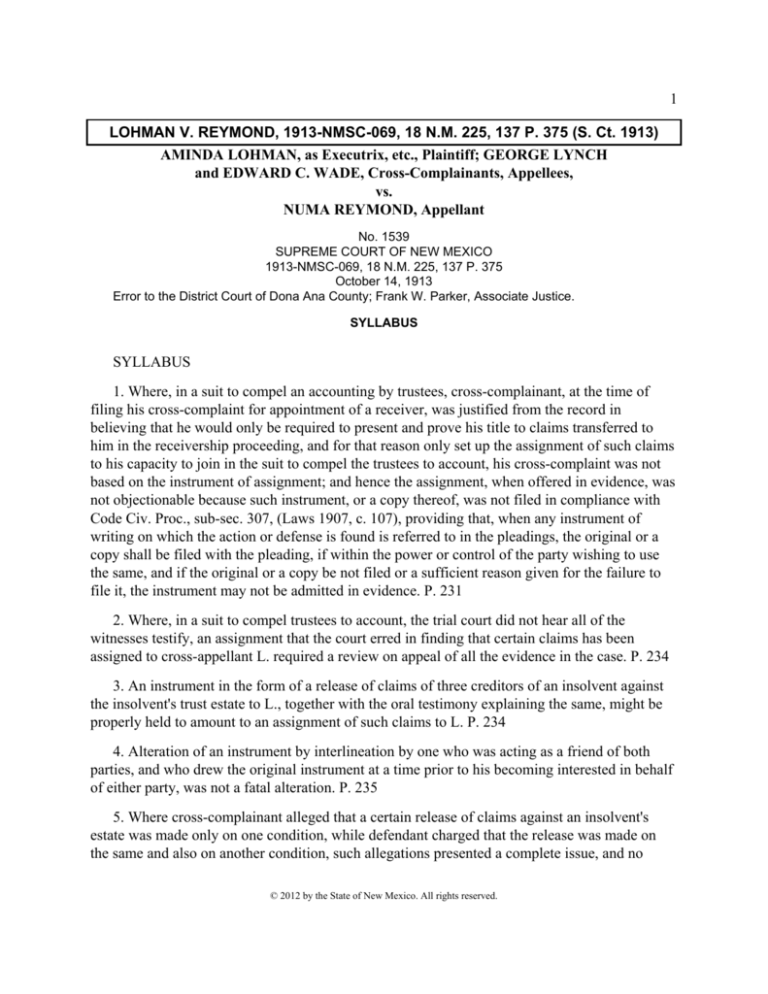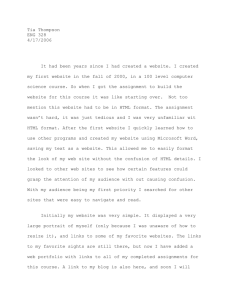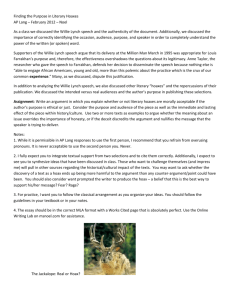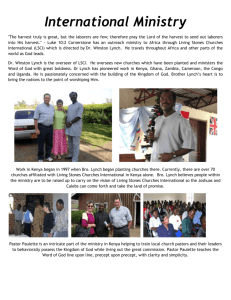
1
LOHMAN V. REYMOND, 1913-NMSC-069, 18 N.M. 225, 137 P. 375 (S. Ct. 1913)
AMINDA LOHMAN, as Executrix, etc., Plaintiff; GEORGE LYNCH
and EDWARD C. WADE, Cross-Complainants, Appellees,
vs.
NUMA REYMOND, Appellant
No. 1539
SUPREME COURT OF NEW MEXICO
1913-NMSC-069, 18 N.M. 225, 137 P. 375
October 14, 1913
Error to the District Court of Dona Ana County; Frank W. Parker, Associate Justice.
SYLLABUS
SYLLABUS
1. Where, in a suit to compel an accounting by trustees, cross-complainant, at the time of
filing his cross-complaint for appointment of a receiver, was justified from the record in
believing that he would only be required to present and prove his title to claims transferred to
him in the receivership proceeding, and for that reason only set up the assignment of such claims
to his capacity to join in the suit to compel the trustees to account, his cross-complaint was not
based on the instrument of assignment; and hence the assignment, when offered in evidence, was
not objectionable because such instrument, or a copy thereof, was not filed in compliance with
Code Civ. Proc., sub-sec. 307, (Laws 1907, c. 107), providing that, when any instrument of
writing on which the action or defense is found is referred to in the pleadings, the original or a
copy shall be filed with the pleading, if within the power or control of the party wishing to use
the same, and if the original or a copy be not filed or a sufficient reason given for the failure to
file it, the instrument may not be admitted in evidence. P. 231
2. Where, in a suit to compel trustees to account, the trial court did not hear all of the
witnesses testify, an assignment that the court erred in finding that certain claims has been
assigned to cross-appellant L. required a review on appeal of all the evidence in the case. P. 234
3. An instrument in the form of a release of claims of three creditors of an insolvent against
the insolvent's trust estate to L., together with the oral testimony explaining the same, might be
properly held to amount to an assignment of such claims to L. P. 234
4. Alteration of an instrument by interlineation by one who was acting as a friend of both
parties, and who drew the original instrument at a time prior to his becoming interested in behalf
of either party, was not a fatal alteration. P. 235
5. Where cross-complainant alleged that a certain release of claims against an insolvent's
estate was made only on one condition, while defendant charged that the release was made on
the same and also on another condition, such allegations presented a complete issue, and no
© 2012 by the State of New Mexico. All rights reserved.
reply was necessary. P. 235
6. By going to trial on the merits and not objecting to evidence, defendant waived any right
he may have had consequent on cross-complainant's failure to reply to defendant's answer. P.
236
COUNSEL
N. C. Frenger, Las Cruces, New Mexico, for appellant.
The writing, Exhibit "A," was not entitled to be admitted in evidence because not filed with
cross-complaint. Session Laws 1907, chapter 107; 3 Wigmore on Evidence, secs. 1845 to 1860; 31 Cyc.
556; Code Civ. Pro. (N. M.)
Ordinarily neither the verdict of a jury nor the findings of fact of a trial court will be disturbed in the
appellate court when they are supported by any substantial evidence. Candelaria v. Miera, 13 N.M. 360;
Territory v. Hicks, 6 N.M. 596.
But, in this case, this Court should review the entire record and try this cause de novo, following the
rule in appeals in equity. Puritan Co. v. Toti and Gradi, 14 N.M. 425.
It is the practice to examine the record to ascertain if substantial evidence exists. Hancock v.
Beasley, 14 N.M. 239; Mining Co. v. Hamilton, 14 N.M. 271.
There could have been no ossignment because the assignee gave no consideration. 4 Cyc. 31.
Exhibit "A" was a release, and being without consideration, it is void. 34 Cyc. 1048-1054; 24 A. & E.
Enc. L. 287, (2nd Ed.)
J. H. Paxton, Las Cruces, New Mexico, for appellee.
Not necessary to file the original or a copy of the instrument held to be evidence, with the
cross-complaint. Laws 1907, sub-sec. 307; Latterett v. Cook, 1 Ia. 1, 63 Am. Dec. 428; Fisher v. Patton,
134 Mo. 32, 33 S. W. 451, 34 S. W. 1096.
The instrument was not the foundation of the action Horne v. Mullis, 46 S. E. 663, 119 Ga. 534; Diggs
v. Way, 51 N. E. 429, 54 N. E. 412, 22 Ind. App. 617; Vannice v. Green, 14 Ia. 262; Bryson v. Kelly, 53
Ind. 486; Duffy v. Carman, 3 Ind. App. 207, 29 N. E. 454; Williams v. Frybarger, 9 Ind. App. 558, 37 N. E.
302; Lester v. People, 150 Ill. 408, 41 Am. St. 375; State v. Wenzel, 77 Ind. 428; Worley v. Moore, 77 Ind.
567; Shetterly v. Axt., 76 N. E. 901, 77 N. E. 865, 37 Ind. App. 687; Conn v. State, 25 N. E. 443, 125 Ind.
514.
Established by the evidence of the written instrument, and by evidence aliunde, that Numa Reymond
assigned to George Lynch all his claim against the estate of the Lynch Brothers. Moore v. Lowery, 25 Ia.
336, 95 Am. Dec. 790.
No particular form is necessary to constitute an assignment. Metcalf v. Kincaid, 87 Ia. 443, 43 Am. St.
391; Drake on Attachments, sec. 562; McDaniel v. Maxwell, 21 Ore. 202, 28 Am. St. 740; Hull v. Smith, 8
How. Prac. 281.
An assignment for valuable consideration will not be set aside for technical error. Noble v. Hunter, 2
Kans. App. 538, 43 Pac. 994.
Intent governs, though inappropriate terms have been used. Ellis v. Secor, 31 Mich. 185, 18 Am.
Rep. 178; Crone v. Braun, 23 Minn. 239; People v. Tioga Com. Pleas, 19 Wend. 73; Buchanan v. Taylor,
(Pa.) Add. 154; Gulf, C. & S. F. Ry. Co. v. Cusenberry, 5 Tex. Civ. App. 114, 23 S. W. 851; Hinkle v.
Wanzer, 17 How. 353, 15 L. Ed. 173; Hooker v. Eagle Bank, 30 N. Y. 83, 86 Am. Dec. 351; Macklin v.
Kinealy, 141 Mo. 113, 41 S. W. 893; Tatum v. Ballard, 94 Va. 370, 26 S. E. 871.
Alterations appearing in the instrument held to evidence an assignment from Numa Reymond to
Lynch, are not such as to affect the validity or admissibility in evidence. Ames v. Brown, 22 Minn. 257; 1
Greenl. Ev., sec. 189; Yeager v. Musgrave, 28 W. Va. 90; White Sewing Machine Co. v. Dakin, 86 Mich.
581, 49 N. W. 583, 13 L. R. A. 315; Barlow v. Buckingham, 68 Ia. 169, 26 N. W. 58; Sharpe v. Orme, 61
Ala. 263; Sill v. Reese, 47 Cal. 294; Andrews v. Burdick, 62 Ia. 714, 16 N. W. 275; Hervey v. Harvey, 15
Me. (3 Shep.) 357; Ames v. Colburn, 77 Mass. (11 Gray) 490, 71 Am. Dec. 723; McRaven v. Crisler, 53
Miss. 542; Foote v. Hambrick, 70 Miss. 157, 35 Am. St. 631; Lee v. Butler, 167 Mass. 426, 57 Am. St.
466 Equitable Mfg. Co. v. Allen, 76 Vt. 22, 56 Atl. 87, 104 Am. St. 915; Lee v. Alexander, 9 B. Monroe 25,
48 Am. Dec. 412; Pierson v. Grimes, 30 Ind. 129, 95 Am. Dec. 673; Wallace v. Tice, 51 Pac. 733, 32 Ore.
283; Brooks v. Allen, 62 Ind. 401; Murray v. Peterson, 6 Wash. 418, 33 Pac. 969; Goodfellow v. Inslee, 12
N. J. Eq. (1 Beasl.) 355; Condict v. Flower, 106 Ill. 105; Deering Harvester Co. v. White, 72 S. W. 962;
110 Tenn. 132; Mathias v. Leathers, 68 N. W. 449, 99 Ia. 18; Forbes v. Taylor, 35 So. 855, 139 Ala. 286.
There was no tacit admission, by Lynch's failure to reply to Reymond's answer, of Reymond's
allegation that his agreement was conditioned upon the joinder of all other creditors.
The allegation of the cross-complaint and the denial in the answer, when taken together, make a
definite and clear cut issue. Stephen on Pleading, 154; Hill v. Smith, 27 Cal. 476; Watkinds v. So. Pac. R.
Co., 38 Fed. 711, 4 L. R. A. 241; Wahl v. Murphy, (Ky.) 9 S. W. 375; Smith v. L. & N. R. Co., 95 Ky. 11,
23 S. W. 652, 22 L. R. A. 72; Union Ins. Co. v. Murphy, (Pa.) 4 Atl. 352.
Where a special plea amounts to no more than the general issue, which has also been pleaded, no
replication is necessary. King v. Burnham, 101 N. W. 302, 93 Minn. 288; Johnson v. Andrews, 68 N. Y.
Sup. 764, 34 Misc. Rep. 89; Luther v. Brown, 66 Mo. App. 227; Jordan v. Buschmeyer, 97 Mo. 94, 10 S.
W. 616; Goddard v. Fulton, 21 Cal. 430; Arthur v. Brooks, 14 Barb. 533.
By going on trial on the merits and not objecting to evidence, Reymond waived any right he may have
had, consequent upon Lynch's failure to reply to his answer. Coler v. Boar dof Co. Commrs., 6 N.M. 117;
Faucette v. Ludden, 117 N. C. 170, 23 S. E. 173; Looney v. Linney, (Tex. Civ. App.) 21 S. W. 409;
Sawtelle v. Muncy, 48 Pac. 387, 116 Cal. 435; Sigafus v. Porter, 179 U.S. 116, 21 Spu. Ct. R. 34, 45 L.
Ed. 113; Union P. R. Co. v. Snyder, 152 U.S. 684, 14 Sup. Ct. R. 756; 38 L. Ed. 597.
JUDGES
Abbott, D. J. Parker, J., being disqualified, did not participate in this opinion.
AUTHOR: ABBOTT
OPINION
{*229} STATEMENT OF FACTS.
{1} On December 6, 1892, the cross-complainant, George Lynch, and his two brothers, since
deceased, executed their deed of trust for the benefit of creditors to the plaintiff, Martin
Lohman, and to the defendant, Numa Reymond, as trustees. Numa Reymond having left the
country, Martin {*230} Lohman, trustee, had instituted this suit against Numa Reymond, trustee,
and the creditors as defendants, including George Lynch and William Lynch, surviving members
of the firm of Lynch Brothers, to remove Numa Reymond as such trustee. Numa C. Frenger was
appointed by order of the court trustee in place of Numa Reymond. Thereafter, and during the
year 1909, George Lynch filed his cross-complaint in the nature of a bill in equity praying for an
accounting by the trustees and the appointment of a receiver for the trust estate to take
possession and dispose of the same under the provisions of said trust deed and under the
direction and order of the Court.
{2} George Lynch alleged in his cross-complaint that he is also interested as a creditor of the
estate by assignments from other creditors, in addition to his interest as a residuary beneficiary.
Martin Lohman and Numa Reymond, being in court only as trustees, undertook, nevertheless, to
answer the cross-complainant in their individual and personal capacity, and to litigate their
individual controversies with Lynch in this suit. The suit was tried upon the issues made by the
cross-complaint of George Lynch, the answer of plaintiff Martin Lohman, the reply of defendant
George Lynch, and the answer of defendant Numa Reymond. It is also stipulated in the case that
the reply of George Lynch to the answer of Martin Lohman shall be treated as a reply of Edward
C. Wade as co-cross-complainant with George Lynch, to the answer of Numa Reymond. The
vital question upon the appeal is whether Numa Reymond assigned to George Lynch his claim as
a creditor against the estate in question.
{3} On or about December 13, 1906, Numa Reymond, John H. Riley and Martin Lohman, for
the consideration of their mutual promises and for the express consideration of one dollar in
hand paid, agreed together orally to release (or assign) and did release (or assign) to George
Lynch their claims against the trust estate of Lynch Brothers. In pursuance of this oral agreement
(or assignment) they executed and delivered to George Lynch a written instrument appearing on
its face to be a release {*231} to George Lynch, of all their claims against George Lynch. The
trial court found as a fact that the said Lohman, Riley and Reymond did in fact assign to George
Lynch their claims against Lynch Brothers and upon conflicting evidence the trial court found
that this assignment was made conditionally. The typewritten instrument in evidence contained a
condition written with a pen below, after the signatures of the parties.
OPINION OF THE COURT.
{4} The vital question for decision in this case is raised by the first assignment of error,
which is
"That the District Court erred in admitting in evidence the release submitted by appellees
George Lynch and Edward C. Wade and marked exhibit "A" under their evidence, upon the
ground that the same was referred to in appellee's cross-complaint, and the same, or a copy
thereof, was not filed with said cross-complaint, the same having been within their power and
control, and no sufficient reason having been given for failure so to do, -- and which said
cross-complaint and their action thereby was founded, as to their rights claimed against
appellant, upon said release, it being an instrument in writing."
{5} The argument of appellant is that in so far as appellee George Lynch claims to be the
owner of the credits of appellant under said estate of Lynch Brothers, this action was founded
upon the writing appearing in evidence as exhibit "A." It is referred to in the cross-complaint, the
same, or a copy thereof, was not filed with said cross-complaint, though within the power and
control of said George Lynch, and no sufficient reason was given for failure to do so. The said
writing was therefore not entitled to be admitted in evidence, under sub-section 307 of the Code
of Civil Procedure, which is as follows:
"When any instrument of writing upon which the action or defense is founded is referred to
in the pleadings, the original or a copy thereof shall be filed with the pleading, if within the
power or control of the party wishing to use the same, and if such original or copy thereof be not
filed {*232} as herein required, or a sufficient reason given for failure to do so, such instrument
of writing shall not be admitted in evidence upon the trial."
{6} It is evident upon the face of the record that George Lynch filed his cross-complaint
against Numa Reymond only in Reymond's capacity as trustee. He prayed for an accounting by
the trustees and the appointment of a receiver for the trust estate. Unless George Lynch had
something more than a mere interest as residuary beneficiary of the trust estate, it is questionable
whether he would have an interest sufficient to entitle him to maintain his action, and it was
therefore proper to allege that certain creditors had assigned their claims against the trust estate
to Lynch so as to show Lynch's interest and right to sue. The written instrument from Reymond,
Riley and Lohman to Lynch was not pleaded as a basis of the action, nor was any recovery
sought upon it. Lynch did not sue as assignor individually or personally; there was no occasion
to do so; nor could he know that there ever would be such action. He was justified in taking the
position that he would only have to present his title in the receivership proceedings. In his
cross-complaint he was not seeking to confirm his title to the claims of Lohman, Reymond and
Riley against the trust estate.
{7} The record shows that up to the time of the filing of the answer of Lohman and Reymond
to the cross-complaint, that Lohman and Reymond were only sued in the action in their capacity
as trustees. So far as the record shows, Lynch could not then know that there would be any
occasion for personal suit against any of the creditors who had released (or assigned) their claims
to him. The trustees, Lohman and Reymond, however, being in court only as trustees, undertook
to answer the cross-complaint in their individual and personal capacity and to litigate their
individual controversies with Lynch in this suit under his cross-complaint. At the time of filing
his cross-complaint he was, from the record, justified in thinking he would only have to present
his title in the receivership proceedings. To question his right and title to the claims of {*233}
Lohman, Reymond and Riley against the trust estate in his cross-complaint, in which he was
suing for an accounting and receivership, would have been improper pleading. It is a copy of the
instrument on which the suit is founded which is to be attached to plaintiffs' complaint, and not
the evidence required to sustain his case. In this case the release from Reymond, Lohman and
Riley was not the instrument upon which the action of appellee was founded, but nothing more
than a part of the evidence upon which he had a right to rely in case his title to the claims of
Lohman, Reymond and Riley was questioned. It was proper for appellee to set forth all of his
interest in the trust estate so that his right to maintain his action might be unquestioned. Suppose
it was shown upon the face of his cross-complaint that the claim of creditors were in so large
amount that appellee would certainly have no interest as residuary beneficiary. The record shows
in this case that the appellee did not base his title wholly upon the so-called release, but that an
oral agreement previous to the written instrument was also relied upon. He had no reason to
believe that his title to the claims of Reymond, Lohman and Riley would be questioned in this
action and his cross-complaint was not based upon such instrument and it therefore becomes not
only unnecessary but improper for the same to have been set forth in his cross-complaint, and his
action not being founded thereon, the same was not inadmissible in evidence. Lattourett v. Cook,
1 Cole's 1, (Ia.), 63 Am. Dec. 428; Fisher v. Patton, 134 Mo. 32, 34 S.W. 1096, 34 S.W. 1096;
Horne v. Mullis, 46 S.E. 663, 119 Ga. 534; Diggs v. Way, 51 N. E. 429, 54 N. E. 412, 22 Ind.
App. 417; Vannice v. Green, 14 Iowa 262; Bryson v. Kelley, 53 Ind. 486; Duffy v. Carman, 3
Ind. App. 207, 29 N.E. 454; Williams v. Frybarger, 9 Ind. App. 558, 37 N.E. 302; Lester v.
People, 150 Ill. 408, 41 Am. St. Rep. 375, 23 N.E. 387; State v. Wenzel, 77 Ind. 428; Worley v.
Moore, 77 Ind. 567; Shetterly v. Axt., 76 N.E. 901, 77 N. E. 865, 37 Ind. App. 687; Conn. v.
State, 25 N.E. 443, 125 Ind. 514.
{8} The written instrument having been properly admitted {*234} in evidence, it remains to
be determined what is the legal effect of said instrument, and this question is directly raised by
the 8th assignment of error, which is,
"That said Court erred in finding that in law the appellant has assigned over to the appellee,
George Lynch, his claim in and to the Lynch Brothers estate."
{9} Appellee claims that it is established by the evidence of the written instrument held to
have been an assignment from Numa Reymond to George Lynch, and by evidence aliunde, that
Numa Reymond assigned to George Lynch all his claims against the estate of Lynch Brothers.
Appellant argues that there is no evidence that a verbal contract or agreement to assign to George
Lynch was made. The decision of this question brings us to an examination of the whole of the
evidence in the case, under the rule announced in the case of Gallup Electric Light Co. v. Pacific
Improvement Co., 16 N.M. 86, 113 P. 848, as the trial judge did not hear all of the witnesses
testify. The finding of the trial court that an assignment of the claims of appellants Reymond,
Lohman and Riley against the trust estate to George Lynch was made, was based not only upon
the written instrument heretofore referred to, but upon the oral testimony as well.
{10} We have carefully examined the entire record in this case, and are of the opinion that
the finding of the trial court in this regard is sustained by a fair preponderance of the evidence.
The instrument admitted in evidence in this case in the form of a release of the claims of
Reymond, Lohman and Riley against the trust estate to George Lynch, together with the oral
testimony explaining the same, was properly held by the trial court to be in legal effect an
assignment of such claims to George Lynch. Moore v. Lowrey, 25 Iowa 336, 95 Am. Dec. 790;
Metcalf v. Kincaid, 87 Iowa 443, 43 Am. St. Rep. 391, 54 N.W. 867; Drake on Attachments, sec.
562; McDaniel v. Maxwell, 21 Ore. 202, 28 Am. St. Rep. 740, 27 P. 952; Hull v. Smith, 8 How.
Pr. 281; Noble v. Hunter, 2 Kan. App. 538, 43 P. 994; Ellis v. Secor, 31 Mich. 185, 18 Am. Rep.
178; Crone v. Braun, 23 Minn. 239; People v. Tioga Common {*235} Pleas, 18 Wend. 73;
Buchanan v. Taylor, (Pa.) Add. 154; G. C. & S. F. Ry. Co. v. Cusenberry, 5 Tex. Civ. App. 114,
23 S.W. 851; Hinkle v. Wanzer, 58 U.S. 353, 17 HOW 353, 15 L. Ed. 173; Hooker v. Eagle
Bank, 30 N.Y. 83; Macklin v. Kinealy, 141 Mo. 113, 41 S.W. 893; Tatum v. Ballard, 94 Va.
370, 26 S.E. 871.
{11} The alterations appearing in the instrument held to evidence an assignment from Numa
Reymond to George Lynch are not such as to affect its validity or admissibility in evidence, the
same not having been done by the parties to alter its meaning, but only by interlineation by the
person who was acting as the friend of both parties and who drew the original instrument at a
time prior to his becoming interested in behalf of either party. Ames v. Brown, 22 Minn. 257;
Yeager v. Musgrave, 28 W. Va. 90; White Sewing Machine Co. v. Dakin, 86 Mich. 581, 49
N.W. 583, 13 L. R. A. 315; Barlow v. Buckingham, 68 Iowa 169, 26 N.W. 58; Sharpe v. Orme,
61 Ala. 263; Sill v. Reese, 47 Cal. 294; Andrews v. Burdick, 62 Iowa 714, 16 N.W. 275; Hervey
v. Harvey, 15 Me. 357; Ames v. Colburn, 77 Mass. 390, 71 Am. Dec. 723; McRaven v. Crisler,
53 Miss. 542; Foote v. Hambrick, 70 Miss. 157, 35 Am. St. Rep. 631, 11 So. 567; Lee v. Butler,
167 Mass. 426, 57 Am. St. Rep. 466, 46 N.E. 52; Equitable Mfg. Co. v. Allen, 76 Vt. 22, 56 A.
87; Lee v. Alexander, 48 Ky. 25, 9 B. Mon. 25, 48 Am. Dec. 412; Piersol v. Grimes, 30 Ind. 129,
95 Am. Dec. 673; Wallace v. Tice, 51 P. 733, 32 Ore. 283; Brooks v. Allen, 62 Ind. 401; Murray
v. Peterson, 6 Wash. 418, 33 P. 969; Goodfellow v. Inslee, 12 N.J. Eq. 355; Condict v. Flower,
106 Ill. 105; Deering Harvester Co. v. White, 72 S.W. 962, 110 Tenn. 132; Mathias v. Leathers,
68 N.W. 449, 99 Iowa 18; Forbes v. Taylor, 35 So. 855, 139 Ala. 286.
{12} There was no admission, by Lynch's failure to reply to Reymond's answer, of
Reymond's allegation that his agreement was conditioned upon the joinder of all other creditors.
{13} The allegation of the cross-complaint was to the effect that Reymond (together with
other creditors) by his writing {*236} released directly to Lynch his claim against the trust estate.
"Subject only that the claim so released should not inure to the use and benefit of any other
creditors of said Lynch Brothers."
{14} The denial in Reymond's answer is as follows:
"Said Reymond denies all of the allegations of paragraphs five and six of said
cross-complaint, but on the contrary avers that he agreed to release all his rights as creditor in
and to the said Lynch estate in favor of the said George Lynch (upon the condition, however,
that all the other creditors of the said estate likewise relinquish their claims, and upon the further
condition that the said relinquishments should inure to the sole benefit of the said George
Lynch."
{15} The issue is therefore formed by contrary averments, Lynch averring that the release
was made only upon one condition, and Reymond averring that the release was made upon the
same condition and an additional condition. The allegation of the cross-complaint and the denial
in the answer, when taken together, make a definite and clear-cut issue. Watkinds v. So. Pac. R.
Co., 14 Sawy. 30, 38 F. 711, 4 L. R. A. 241. Affirmative allegations in an answer are not
necessarily new matter, so that a replication becomes necessary. If they in fact only show that
some essential allegation of the complaint is not true, then they are only a traverse. Goddard v.
Fulton, 21 Cal. 430; Luther v. Brown, 66 Mo. App. 227; Jordan v. Buschmeyer, 97 Mo. 94, 10
S.W. 616; King v. Burnham, 101 N.W. 302, 93 Minn. 288; Johnson v. Andrews, 68 N.Y.S. 764,
34 Misc. 89; Union Ins. Co. v. Murphy, 1 Sadler 570, 4 A. 352; Smith v. L. & M. N. Ry Co., 95
Ky. 11, 23 S.W. 652, 32 L. R. A. 72.
{16} By going to trial on the merits and not objecting to evidence, Reymond waived any
right he may have had, consequent upon Lynch's failure to reply to his answer. Coler v. Board of
Co. Commrs., 6 N.M. 88, 27 P. 619; Faucette v. Ludden, 117 N.C. 170, 23 S.E. 173; Looney v.
Linney, 21 S.W. 409; Sawtelle v. Muncy, 48 P. 387, {*237} 116 Cal. 435; Sigafus v. Porter, 179
U.S. 116, 21 S. Ct. 34, 45 L. Ed. 113; Union P. R. Co. v. Snyder, 152 U.S. 684, 14 S. Ct. 756, 38
L. Ed. 597.
{17} All of the assignments of error being disposed of, the judgment of the lower court will
be affirmed for the reasons given.
——————————





